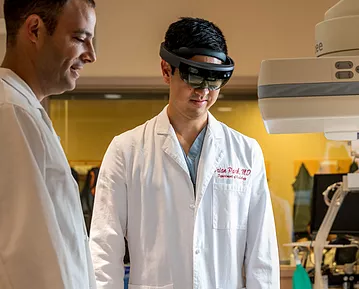 Chris Hensley, MD, PhD was awarded a 2021 RSNA Research Resident/Fellow Grant for his project: “Elucidating Organelle Compartmentation of Breast Cancer Glutamine Metabolism to Understand Whole Tumor PET Data”
Chris Hensley, MD, PhD was awarded a 2021 RSNA Research Resident/Fellow Grant for his project: “Elucidating Organelle Compartmentation of Breast Cancer Glutamine Metabolism to Understand Whole Tumor PET Data”
The Penn Radiology Residency Research Track is designed for candidates who wish to make research an integral part of their residency training and career. The research track incorporates research training into a four-year radiology training program. Its aim is to train a generation of clinician scientists to populate leadership positions in academic radiology. This program is supported by a training grant from the NIH/NINIB, T32-EB004311 (“Research Track Radiology Residency”) for which the Program leadership (Drs. Mankoff, Gade, and Schnall) serve as the grant principal investigators. Application to the Diagnostic Radiology-Research track is open to US citizens and/or permanent residents (Green Card) applicants.

Research Track Structure
The first three years of the research track are spent in clinical radiology, almost identical to the traditional, diagnostic radiology clinical track, including the opportunity to apply for and participate in other elective clinical tracks (BAIR, HLQ, TEACH, Global Health).
To maximize research time, residents will be assigned minimal clinical duties during the research year, thus ensuring a minimum of 10 months of protected research time. Since the research time is integrated into R4 year, there is no extra training time beyond a standard radiology residency program.
The fourth year is spent working on a research project with in a broad range of categories:
- Basic science and animal models
- Translational research
- Informatics and AI
- Quality Improvement
- Imaging development
- Translation Interventional Radiology
Residents have the autonomy to choose their projects according to their research interest. There are many labs either within the department or across the university that residents collaborate with, such as Alan Chu, MD, PhD joining the Robust Methods for Magnetic Resonance group at Penn.
See work by current and former residents
Research Opportunities and Learning
 Monthly small group meetings expose residents to cutting edge science around campus as well as the nuts and bolts of clinical science work.
Monthly small group meetings expose residents to cutting edge science around campus as well as the nuts and bolts of clinical science work.
 Cross-disciplinary collaboration with other schools at the University of Pennsylvania with several projects accepted to Penn Medical Device Accelerator and Healthcare Innovation Accelerator Program.
Cross-disciplinary collaboration with other schools at the University of Pennsylvania with several projects accepted to Penn Medical Device Accelerator and Healthcare Innovation Accelerator Program.
 Excellent grantsmanship guidance (as evidenced by our high rate of acceptance rate for the RSNA R&E Foundation Resident/Fellow Research Grant)
Excellent grantsmanship guidance (as evidenced by our high rate of acceptance rate for the RSNA R&E Foundation Resident/Fellow Research Grant)
Research track residents are strongly encouraged to stay at Penn Medicine for their fellowship to facilitate completion of projects started during their fourth year. To honor that commitment, all research residents are guaranteed a spot in their fellowship of choice, including the two-year Interventional Radiology Independent Residency.
 Brian Park, MD, MS (right) and his mentor Terrence Gade, MD, PhD demonstrate the use of the augmented reality system being applied to interventional radiology applications.
Brian Park, MD, MS (right) and his mentor Terrence Gade, MD, PhD demonstrate the use of the augmented reality system being applied to interventional radiology applications.
World Class Radiology Researchers
Penn Radiology has placed among the top five NIH-funded radiology departments for over 25 years.

NIH Award Winners
Current faculty members and former alums of the program, Terence Gade MD, PhD, and Mark Sellymer MD, PhD, were our first trainees to win the prestigious NIH Director's Early Independence Award (2015 and 2017). The award was established in 2011.

*The Academy's NIH Funding to Diagnostic Radiology Data Collection 2017 rankings: https://www.acadrad.org/wp-content/uploads/2018/10/2017-NIH-Ranking.pdf
†The Radiology Review 2021 rankings https://www.theradiologyreview.com/top-radiology-programs-2021-radiology-department-rankings
#2 (2023) in NIH funding among Radiology departments: https://brimr.org/brimr-rankings-of-nih-funding-in-2023/
Research Track Leadership

David Mankoff, MD, PhD
Research Track Program Director (T32 PI)
Vice Chair for Research, Radiology
Matthew J. Wilson Professor of Research Radiology
RSNA 2020 Outstanding Researcher Award Winner

Terence P. Gade, MD, PhD
Research Track Co-Program Director (T32 co-PI)
Associate Professor of Radiology and Cancer Biology
Co-Director, Penn Image-Guided Interventions Laboratory

Mitchell D. Schnall, MD, PhD, FACR
Research Track Co-Program Director (T32 co-PI)
Chairman, Department of Radiology
Eugene P. Pendergrass Professor of Radiology
Start Your Application
In This Section